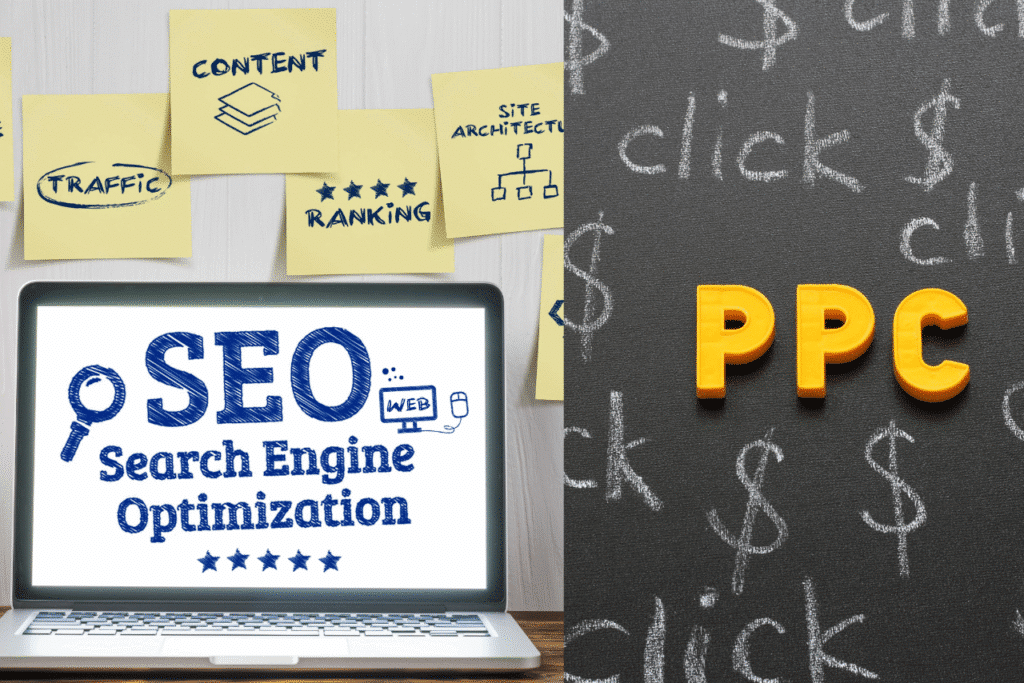If you run a small to medium-sized business in the home services or moving industry, you’ve probably heard the terms SEO and PPC tossed around when it comes to marketing your business online. But what do these acronyms really mean? More importantly, which strategy is the best fit for your company’s growth and budget?
In this blog, we’ll break down SEO (Search Engine Optimization) and PPC (Pay-Per-Click advertising), explore their pros and cons, and help you decide which approach—or combination of both—can drive more customers to your home services or moving business.
SEO vs PPC: Which is Right for Your Business?
SEO (Search Engine Optimization) is the process of improving your website’s visibility on search engines like Google so that your business appears organically (without paying) when someone searches for relevant keywords. For example, if someone types “best moving company near me” or “affordable plumbing services,” you want your website to show up near the top of the search results.
PPC (Pay-Per-Click) is a type of paid advertising where you create ads that appear on search engines or social media platforms. You only pay when someone clicks your ad. Google Ads is the most popular PPC platform, allowing you to bid on keywords so your ad appears when potential customers search for services you offer.
Why Digital Marketing is Essential for Home Services and Moving Companies?
Before diving into the differences between SEO and PPC, it’s important to understand why online marketing is crucial for your business. Most people today turn to Google to find local services. Whether they need a plumber, electrician, or a moving company, they expect quick and relevant results. If your business isn’t visible online, you’re missing out on a significant chunk of potential customers.
Additionally, the home services and moving industries are highly competitive. Many companies are vying for the same local customers. A strong online presence can set you apart, build trust, and ultimately grow your customer base.
Learn more about digital marketing strategies for small businesses.
SEO: The Long-Term Growth Strategy
SEO is all about optimizing your website and online presence so you rank higher in organic search results. This involves keyword research, creating quality content, improving website speed, making your site mobile-friendly, and building backlinks from other reputable sites.
Advantages of SEO:
- Cost-Effective Over Time: While SEO requires investment upfront (in content creation, website optimization, etc.), it doesn’t involve paying for each visitor. Once your site ranks well, you can enjoy steady traffic without ongoing ad spend.
- Builds Trust and Credibility: Organic search results often get more clicks than paid ads because users trust them more.
- Sustainable Results: Effective SEO can maintain your website’s high ranking for months or even years, providing a lasting source of leads.
- Better User Experience: SEO encourages you to create a user-friendly website, which can improve customer satisfaction and conversions.
Challenges of SEO:
- Takes Time: SEO is not an overnight solution. It can take several months to see significant improvements in rankings and traffic.
- Algorithm Changes: Search engines like Google frequently update their algorithms, which can impact your rankings.
- Competitive: Depending on your location and niche, ranking on the first page for specific keywords may be challenging due to intense competition.
For home services and moving companies, SEO can be especially effective for capturing customers who are researching their options before making a decision. For example, blog posts about “how to prepare for a move” or “signs you need a plumber” can attract potential clients early in their buying journey.
PPC: The Fast-Track to Visibility
PPC allows you to place ads at the very top of search results or on social media platforms instantly. You bid on keywords related to your services, and your ads appear when people search for those terms. You only pay when someone clicks your ad, hence the name pay-per-click.
Advantages of PPC:
- Immediate Results: Unlike SEO, PPC can drive traffic to your website as soon as your campaign goes live.
- Highly Targeted: You can target specific locations, demographics, times of day, and even devices, ensuring your ads reach your ideal customers.
- Control Over Budget: You decide how much to spend daily or monthly, making it easier to manage costs.
- Measurable ROI: PPC platforms offer detailed analytics, enabling you to track precisely which ads and keywords are generating leads.
Challenges of PPC:
- Can Be Expensive: Competitive keywords in home services or moving can have high cost-per-click rates, especially in densely populated areas.
- Temporary: Once you stop paying for ads, your visibility disappears.
- Requires Expertise: Managing PPC campaigns effectively requires knowledge of bidding strategies, ad copywriting, and ongoing optimization.
For moving companies, PPC can be a lifesaver during peak seasons when you want to capture as many leads as possible quickly. Home service businesses can also use PPC to promote special offers or emergency services, such as “24-hour plumbing repair.”
How long does it take to see the results of PPC? Learn more here.
SEO vs PPC: Which is Right for Your Business?
The answer depends on your business goals, budget, timeline, and the competitive landscape in your area.
Consider SEO if:
- You want to build a long-term online presence.
- You have a limited budget and want to maximize your marketing investment over time.
- Your services have a longer buying cycle where customers research before deciding.
- You want to build trust and authority in your local market.
- You’re willing to be patient and invest in quality content and website improvements.
Consider PPC if:
- You need immediate leads and can invest in advertising.
- You want to target specific geographic areas or demographics quickly.
- You’re running time-sensitive promotions or seasonal campaigns.
- You want to test which keywords or services generate the most interest.
- You can allocate a budget for ongoing campaign management or hire an expert.
The Best Approach: Combining SEO and PPC
For many home services and moving companies, the most effective strategy is to combine both SEO and PPC. Here’s why:
- Maximize Visibility: PPC ads appear above organic results, so you dominate the search engine results page (SERP).
- Test and Learn: Use PPC to test which keywords convert best, then focus your SEO efforts on those keywords.
- Capture Customers at Different Stages: PPC can target customers ready to book immediately, while SEO attracts those in the research phase.
- Balance Budget and Results: PPC can generate quick revenue, while SEO builds sustainable growth without ongoing ad spend.
For example, a moving company might use PPC ads during the busy summer months to capture immediate leads and run SEO campaigns year-round to build organic traffic.
Practical Tips for Home Services and Moving Companies
- Local SEO is Key: Optimize your Google My Business profile, gather reviews, and use local keywords like “moving company in [City]” or “emergency plumbing services near me.”
- Mobile-Friendly Website: Since most customers search on mobile devices, ensure your site loads quickly and looks great on phones.
- Clear Calls to Action: Whether through SEO content or PPC ads, make it easy for visitors to contact you or request a quote.
- Track Your Results: Use tools like Google Analytics and Google Ads reports to monitor traffic, conversions, and ROI. Understanding what works allows you to invest smarter and grow faster.
- Leverage Customer Reviews and Testimonials: Positive reviews build trust and improve your SEO rankings. Encourage satisfied customers to leave reviews on Google, Yelp, or industry-specific directories.
- Create Helpful Content: For SEO, develop blog posts, FAQs, and service pages that answer common customer questions. For example, a moving company might write about “Tips for Packing Fragile Items” or “How to Choose the Right Moving Date.”
- Use Retargeting in PPC: Retargeting ads show your ads to people who’ve already visited your website, reminding them of your services and increasing the chances they’ll convert.
Budget Considerations for Small and Medium Businesses
Budget is often a deciding factor between SEO and PPC. Here’s how to think about it:
- SEO Investment: Typically involves upfront costs for website improvements, content creation, and possibly hiring an SEO specialist or agency. Monthly costs may decrease once your site is optimized, but ongoing content and link-building efforts are essential for sustained success.
- PPC Investment: Requires a steady ad spend that can vary widely depending on your market and competition. You’ll also need to allocate funds for campaign management, either by hiring someone or learning to manage campaigns yourself.
- For many small businesses, a modest PPC budget combined with a strong SEO foundation offers a balanced approach. This way, you get immediate leads from PPC while building organic traffic that reduces your reliance on paid ads over time.
Common Mistakes to Avoid
Whether you choose SEO, PPC, or both, be mindful of these pitfalls:
- Ignoring Mobile Users: A site that isn’t mobile-friendly can lose visitors and hurt SEO rankings.
- Not Tracking Conversions: Without tracking calls, form submissions, or bookings, you won’t know which marketing efforts are paying off.
- Overlooking Local SEO: For home services and moving companies, local search optimization is crucial. Don’t neglect your Google My Business listing or local citations.
- Setting and Forgetting PPC Campaigns: PPC requires ongoing monitoring and optimization. Unmanaged ads can quickly drain your budget.
- Focusing Only on Keywords: Content quality and user experience matter just as much as keywords in SEO.
Final Thoughts: Making the Decision
For small to medium-sized home services and moving companies, there’s no one-size-fits-all answer to SEO vs PPC. Your business goals should guide your decision, how quickly you need results, and your marketing budget.
If navigating SEO and PPC feels overwhelming, consider partnering with a digital marketing agency that understands the unique challenges of home services and moving companies. They can help create a tailored strategy that fits your budget and goals, so you can focus on what you do best—serving your customers.
Salazar Digital – Marketing & Web Design
1172 Murphy Ave Suite #208, San Jose, CA 95131
(408) 662-1315







